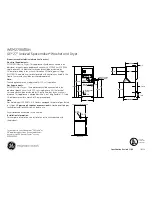
22
Always do the following to maintain washer freshness
■
Use only HE High Efficiency detergent.
■
Leave the door slightly open after each cycle to allow for
better ventilation and drying of washer interior.
■
Run this procedure on a monthly basis using
²⁄₃
cup (160 mL)
of liquid chlorine bleach.
■
If the procedure does not sufficiently improve the machine
freshness, evaluate your installation and usage conditions for
other causes.
Cleaning the exterior
Use a soft damp cloth or sponge to wipe up any spills.
Occasionally wipe the outside of your washer to keep it looking
new. Use mild soap and water. Do not use abrasive products.
Cleaning the dispenser drawer
The dispenser drawer is removable for easy cleaning.
1. Unlock the dispenser drawer by pressing the Release Lever in
the Prewash compartment. See “Using the Dispenser.”
Remove the drawer.
2. Remove the inserts (the siphon from the softener and bleach
compartments and the selector).
3. Wash the parts under running water.
4. Replace the inserts and return the dispenser to the drawer.
Water Inlet Hoses
Replace inlet hoses after 5 years of use to reduce the risk of hose
failure. Periodically inspect and replace inlet hoses if bulges,
kinks, cuts, wear or leaks are found.
When replacing your inlet hoses, record the date of replacement.
Vacation, Storage, and Moving Care
Install and store your washer where it will not freeze. Because
some water may stay in the hoses, freezing can damage your
washer. If storing or moving your washer during freezing weather,
winterize it.
Non-use or vacation care:
Operate your washer only when you are at home. If you will be on
vacation or not using your washer for an extended period of time,
you should:
■
Unplug washer or disconnect power.
■
Turn off the water supply to the washer. This helps avoid
unintended flooding (due to a water pressure surge) while you
are away.
■
Slightly open door to provide ventilation.
To winterize washer:
1. Put 1 qt (1 L) of R.V.-type antifreeze in the drum.
2. Run washer on a Drain & Spin cycle.
3. Unplug washer or disconnect power.
4. Shut off both water faucets.
5. Disconnect water inlet hoses from faucets and drain.
To use washer again:
1. Flush water pipes. Reconnect water inlet hoses to faucets.
Turn on both water faucets.
2. Plug in washer or reconnect power.
3. Run the washer through the Normal/Casual cycle with
¹₂
the
manufacturer’s recommended amount of HE detergent for a
medium-size load, to clean the washer and remove the
antifreeze, if used.
To transport the washer:
1. If washer will be moved during freezing weather, put in 1 qt
(1 L) of R.V.-type antifreeze in the drum. Run washer on a
Drain & Spin cycle.
2. Unplug the power cord.
3. Disconnect the drain hose from the drain system and attach
to rear panel clips.
4. Shut off both water faucets.
5. Disconnect the water inlet hoses from faucets, then drain the
hoses and clip them to the rear panel of the washer.
IMPORTANT: Call for service. Do not reuse transport bolts.
Washer must be transported in the upright position. To avoid
suspension and structural damage to your washer, it must be
properly set up for relocation by a certified technician.
Reinstalling the washer
1. Follow the “Installation Instructions” to locate, level and
connect the washer.
2. Run the washer through the Normal/Casual cycle with
¹₂
the
manufacturer’s recommended amount of HE detergent for a
medium-size load, to clean the washer and remove the
antifreeze, if used.
Electrical Shock Hazard
Plug into a grounded 3 prong outlet.
Do not remove ground prong.
Do not use an adapter.
Do not use an extension cord.
Failure to follow these instructions can result in death,
fire, or electrical shock.
WARNING
















































